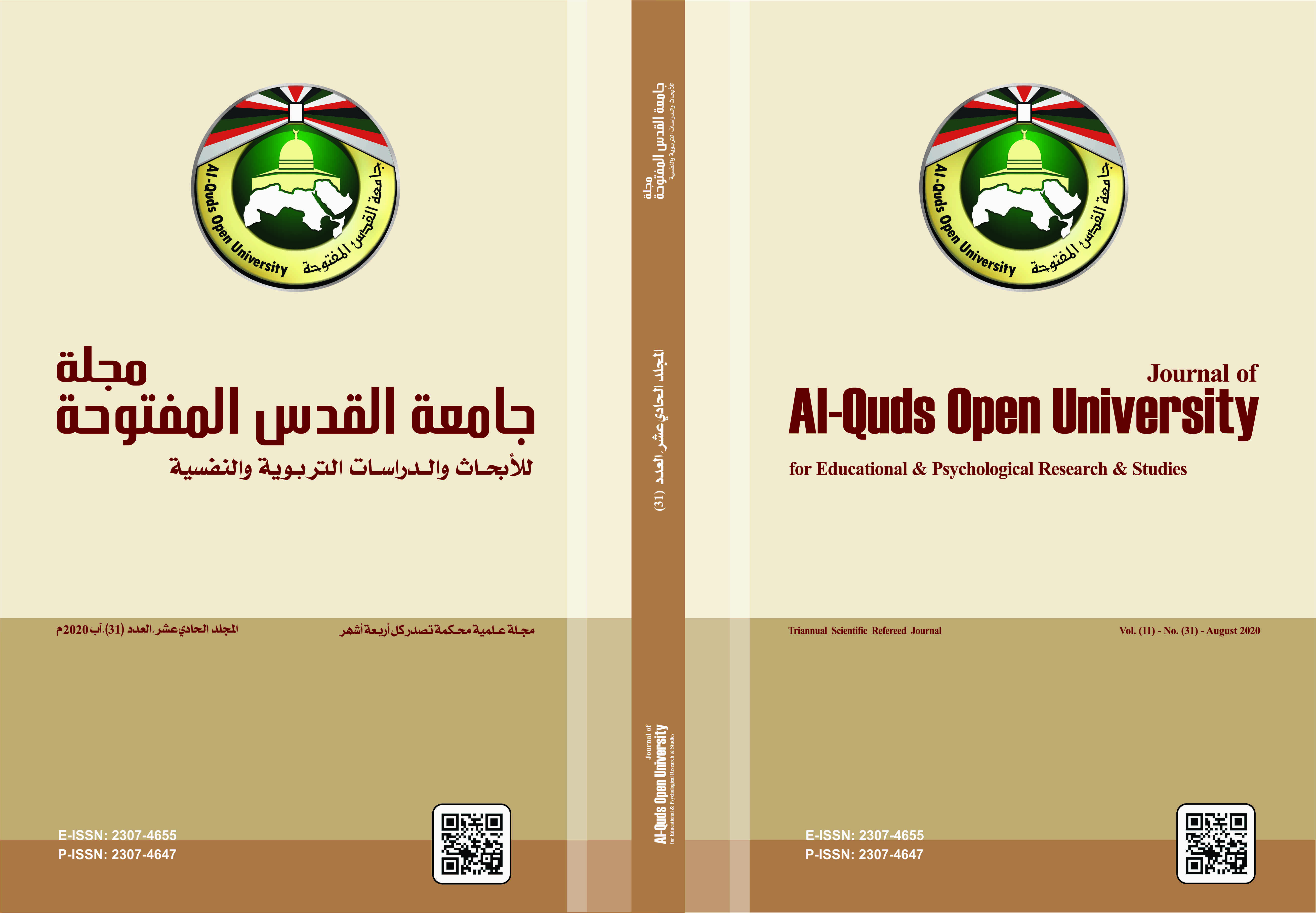The Degree of Using Instructional Technology Innovations by Secondary Stage Teachers at Northern al - Mazar Schools in Jordan
DOI:
https://doi.org/10.33977/1182-011-031-003Keywords:
Instructional Technology Innovations, Secondary School Teachers at Northern al - MazarAbstract
This study aimed at identifying the degree of using instructional technology innovations by secondary stage teachers in light of some variables. The sample consisted of 317 male and female teachers at northern al - Mazar education directorate, chosen using the availabile sampling method, for the second semester of the academic year 2018/ 2019, the researcher used a descriptive approach.
In order to achieve the study objectives, the researchers used the scale of teacher - knowledge of technology (TKT) through applying the dimension of using instructional technology innovations.
The results indicated that the degree of using instructional technology innovations among the secondary stage teachers was high. There were no statistical significant differences related to gender, experience, and scientific qualification.
The researcher recommends intensifying training courses for male and female teachers to acquaint them with new experiences in the field of instructional technology.
References
الحدابي، داود وعيسى، صالح. (2019). مدى اتقان طلبة قسم تكنولوجيا التعليم بجامعة إب اليمنية لمهارات مستحدثات تكنولوجيا التعليم. المجلة العربية للتربية العلمية والتقنية 8(3)، 78-58.
خضر، عزة. (2013). الكفايات التدريسية اللازمة لمعلمي العلوم في ضوء بعض مستحدثات تكنولوجيا التعليم. مجلة العلوم التربوية، 2 (19).
سليم، رانية. (2017). واقع توظيف معلمات المرحلة الثانوية لمستحدثات تقنيات التعليم في ضوء معايير الجودة الشاملة في مدينة جدة. دراسات عربية في التربية وعلم النفس، 4(90).
سيفين، عماد.( 2009). الوعي بالمستحدثات التكنولوجية لدى المعلمين الملتحقين بالدبلوم المهنية "شعبة تكنولوجيا التعليم" في ضوء بعض المتغيرات. المؤتمر العلمي الرابع، التعليم وتحديات المستقبل ابريل.
الشرقاوي، جمال.(2003). مستوى التنور في مستحدثات تكنولوجيا التعليم لدى طلاب كلية التربية الشعبة الصناعية ومعلمي التعليم الثانوي الصناعي. الجمعية المصرية للمناهج وطرق التدريس، 91(4).
صالح، إيمان وحميد، حميد. (2005).الاحتياجات المجنية لأعضاء هيئة التدريس بكليات التربية من المستحدثات التكنولوجية في ضوء معايير الجودة الشاملة. مجلة دراسات تربوية واجتماعية، 21 (2).
عطار، عبدالله. (2011). الاحتياجات التدريبية لأعضاء هيئة التدريس بالكلية الجامعية بمكة المكرمة في مجال مستحدثات تكنولوجيا التعليم. الجمعية العلمية السعودية للمناهج والإشراف التربوية، 3 (1).
العليمات، علي. (2009). مستوي وعي معلمي العلوم في المرحلة الأساسية بمستحدثات تقنيات التعليم. مجلة المنارة للبحوث والدراسات، 15 (3).
عوض، منير. (2013). درجة استخدام المستحدثات التكنولوجية في برامج التعليم المستمر في الجامعات الفلسطينية. مجلة جامعة القدس المفتوحة للأبحاث والدراسات التربوية والنفسية، 1(4).
عودة، أحمد. (2010). القياس والتقويم في العملية التدريسية. الأردن: دار الأمل للنشر والتوزيع.
الغنيم، حمد. (2017). الوعي بمستحدثات تكنولوجيا التعليم لدى طلبة الدبلوم العام في التربية في ضوء بعض المتغيرات. الجمعية العربية لتكنولوجيا التعليم، 4(33).
الفرجاني، عبد العظيم. (1993). تكنولوجيا تطوير التعليم. القاهرة: دار المعارف للنشر والتوزيع.
القحطاني، هنادي. (2018). كفايات معلم التربية الخاصة في توظيف مستحدثات تكنولوجيا التعليم عبر وسائل التواصل الاجتماعي. مجلة الجامعة الاسلامية للدراسات التربوية والنفسية، 26(3).
نصر، محمد علي.(2000). رؤية مستقبلية للتربية العملية في عصر المعلوماتية والمستحدثات التكنولوجية. الجمعية العلمية المصرية للتربية العملية، المؤتمر العلمي الرابع، التربية العملية للجميع 31 يوليو-3 اغسطس.
المراجع الأجنبية
Akpan, B. (2010). Innovations in Science and Technology Education through Science Teacher Associations. Science Education International, 21(2), 235-340.
Bennett, S., & Maton, K. (2010). Beyond the 'digital natives' debate: Towards a more nuanced understanding of students' technology experiences. Journal Of Computer Assisted Learning, 26(5), 321-331
Gray, L., Thomas, N., & Lewis, L. (2010). Teachers' use of educational technology in US public schools: 2009. first look. NCES 2010-040. National Center for Education Statistics.
Hew, K. F., & Brush, T. (2007). Integrating technology into K-12 teaching and learning: Current knowledge gaps and recommendations for future research. Educational Technology Research & Development, 55(3), 223-252.
Hughes, J. (2005). The role of teacher knowledge and learning experiences in forming technology-integrated pedagogy. Journal of Technology & Teacher Education, 13(2), 277- 302.
Koçak, Y., Atman, N. (2013). Teachers’ Perceptions Regarding Usefulness of Technology as an Innovation. Elementary Education Online, 12(1), 52-65
Maltabarova, N., Kokoshko, A., Abduldayeva, A., Shanazarov, N., Smailova, G. (2019). Innovation Technologies in Student’s Independent Activity and Creativity Development: The Case of Medical Education. Innovation Technologies in Student’s Independent Activity and Creativity Development, 14(11).
Mishra, P., & Koehler, M. J. (2006). Technological pedagogical content knowledge: A framework for teacher knowledge. Teachers College Record, 108(6), 1017-1054.
Pea, R. D. (1985). Beyond amplification: Using the computer to reorganize mental functioning. Educational Psychologist, 20, 167-182.
Schmidt, D. A., Baran, E., Thompson, A. D., Mishra, P., Koehler, M. J., & Shin, T. S. (2009). Technological pedagogical content knowledge (TPACK): The development and validation of an assessment instrument for preservice teachers. Journal of Research on Technology in Education, 42(2), 123-149.
Vannatta, R. A., & Fordham, N. (2004). Teacher dispositions as predictors of classroom technology use. Journal of Research on Technology in Education, 36(3), 253-271.
Yan, H., Xiao, Y., & Wang., Q. (2012). Innovation in the educational technology course for preservice student teachers in East China Normal University. Australasian Journal of Educational Technology, 28(6) 1074-1081.
Downloads
Published
How to Cite
Issue
Section
License
- The editorial board confirms its commitment to the intellectual property rights
- Researchers also have to commit to the intellectual property rights.
- The research copyrights and publication are owned by the Journal once the researcher is notified about the approval of the paper. The scientific materials published or approved for publishing in the Journal should not be republished unless a written acknowledgment is obtained by the Deanship of Scientific Research.
- Research papers should not be published or republished unless a written acknowledgement is obtained from the Deanship of Scientific Research.
- The researcher has the right to accredit the research to himself, and to place his name on all the copies, editions and volumes published.
- The author has the right to request the accreditation of the published papers to himself.







2.png)






_2.png)

